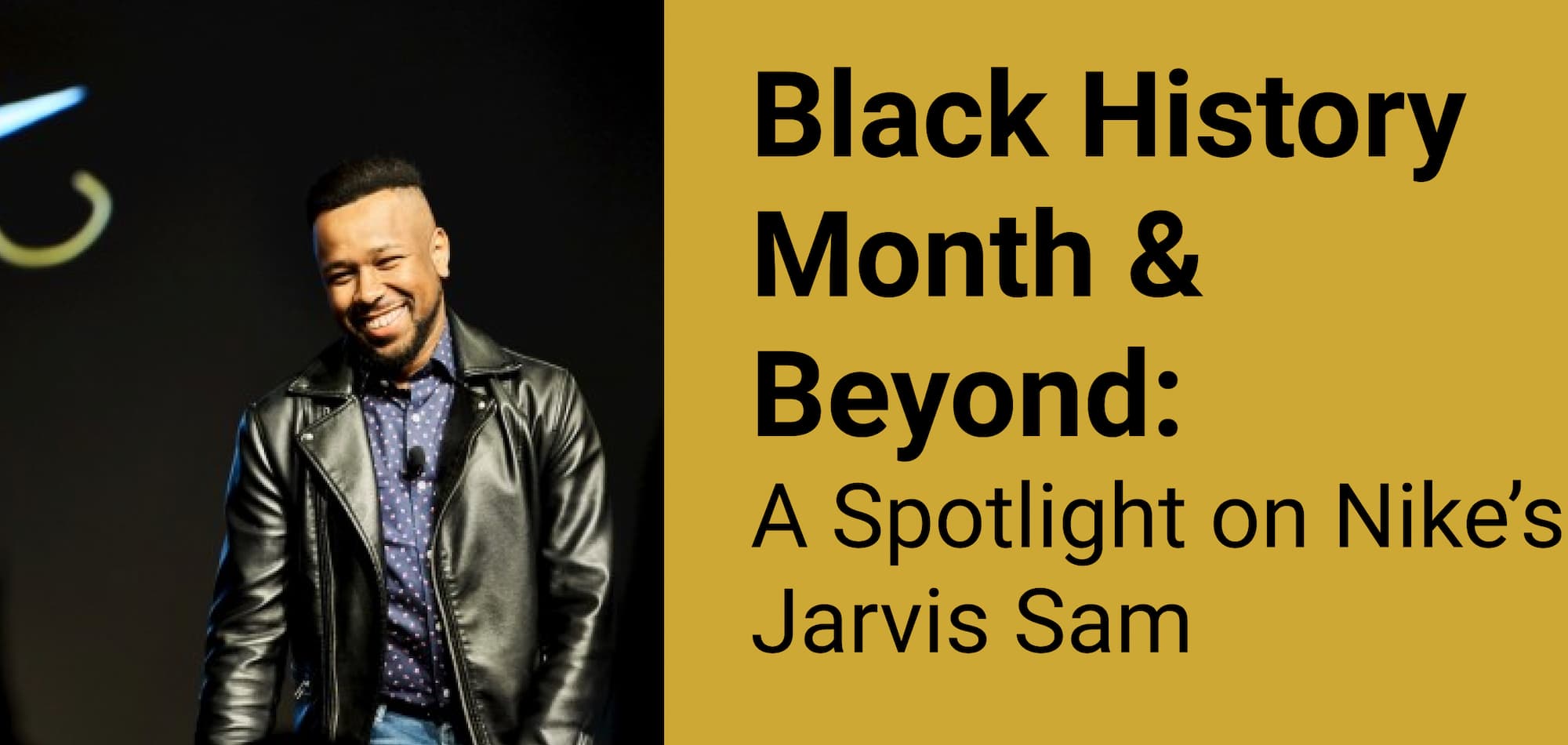As Black History Month comes to an end, we all look to see how we can improve our DE&I strategies for the year ahead, and how we can build stronger allyship to continue the march forward.
If 2020 taught us anything, it was that we must move away from performative allyship, which seeks to gratify the ego without action, and toward active allyship that pushes us to respond to and rebel against the social injustices that we witness.
In an effort to unpack weighty topics such as these, we sat down with the inspirational Jarvis Sam, VP, Global DE&I at Nike, to tell us what companies should be doing to support Black employees, now, and in every other month of the year.
1. In a virtual world, and during the pandemic, under-represented employees have been the most impacted - what advice would you give Black employees in this time of decentralized or remote work?
Before we start, Jarvis takes a moment to recognize that working from home is a privilege that’s not shared by everyone.
“The reality of the situation is the majority of underrepresented populations are not able to enjoy the privilege of ‘working from home’ - a lot of them are essential workers. And so they are still in fast food, in retail, in healthcare, and medicine, making sure that we all are continuing to live a sustained life.”
Jarvis also reflects on how the reduced the number of spaces we now operate in creates a heightened sense of emotional awareness.
“That's why I think there’s a sharper awareness to the May 25th, 2020 murder of George Floyd, and the virulent violence against Asian American communities that we're seeing in North America, because we’ve lost that direct access to human connection.”
When it comes to advice for Black professionals navigating work during this time, Jarvis’ words truly hit home.
“Continue to push forward. Focus on elevating and amplifying, but also understand you're not on the hook for describing your experience or background to anybody. You know, there's a certain amount of education and understanding that people need to seek on their own. And so make sure that you are taking the time to focus on mindfulness, on meditation, on self awareness on self health, on mental health, to really ensure that you are surviving during this challenging time. Taking a step back and finding value in things that we're already doing is so powerful.”
2. What are you seeing as effective organization goals to support Black employees?
“The first thing would be to focus on development, whether it's in the form of mentorship or sponsorship, as well as focused development endeavors; give the time and attention to Black employees.”
Jarvis comments that many companies are focusing on hiring more Black talent in the aftermath of 2020 and during reflective periods like Black History Month, but work still needs to be done to uplift the experiences of existing Black professionals.
“You're seeing significant investments being made in historically Black colleges and universities here in the US, as well as programs for Black talent around the world, and that's incredible. However, we don't want to neglect the Black talent that's already at our company. So where we can focus on helping these individuals achieve their career aspirations provides an opportunity to amplify their experience, help them see their realized potential, and actually see the same companies that they contribute to on a daily basis, either as consumers or as employees or teammates, really invested in their own experience and their own journey.”
Jarvis adds that initiatives such as these can't and shouldn't be led by minorities, and active allyship is the only way to make real progress.
“Companies should also be focusing on creating focus points of education and awareness to drive effective active allyship. These conversations around amplifying Black Lives Matter or efforts that companies like Nike are leading around ‘stop Asian hate’ can't simply be taken on by the marginalized population, we have to have active allies in that regard. And you'll notice I continue to draw the distinction on the word active, because we want the avoidance of passive or performative allyship, we need people who are actually taking the time to learn and build upon their own cultural awareness and cultural intelligence, to drive the right type of impact, to be part of the journey with Black populations.”
Wondering how to champion active allyship at your business? Jarvis outlines the framework he works by.
“It starts with education, then understanding, empathy, and action. And empathy is that critical pivot point, because a lot of folks will demonstrate sympathy, they will, “feel sorry for me”, and that's not helpful. I need people to understand where they may have been complicit in the marginalization of communities previously, where they have not done enough to help advance the perspective of the community, and then situate themselves in the work that is the demonstration of real empathy. And when you go on that journey, that’s where you demonstrate real and apparent active allyship.”
As a final point, Jarvis notes that an important thing that companies can do to support Black employees is to simply provide the space in time.
“We're navigating so many different constraints right now, and because of that heightened awareness of social and racial inequality, the experiences that diverse communities are having right now is heightened in a way that I would say, has not existed over the preceding couple of decades. This gives companies an opportunity to provide the space for these employees to demonstrate mindfulness and start seeing the link between mindfulness and the continued creation of a culture of inclusion and belonging.”
3. What DE&I initiatives have you helped Nike to launch?
Nike is focused on a variety of different DE&I initiatives, ranging from representation to education, development, and community, so we wanted to learn more.
“Some of the initiatives that I am most proud of are the pipeline development programs. We partnered with Serena Williams on the development of the training, which is about amplifying access for individuals of color to be able to enter the design space. Another endeavor that we built is called a win program -Women in Nike - we're in partnership with the WNBA and we have brought on board to date 26 retired WNBA players to be part of our product creation and brand market. These women are absolutely incredible. They have inspired significant cultural impact not only on their teams and their organizations, but at the company overall.”
Aside from combining DE&I initiatives with their product innovations, Nike are always looking inwards to find ways to better their team.
“Beyond that, we are installing some incredible education programs for our teammates so that we can learn and understand the cultural histories of others, understand how we interact with and impact the world, and continue to drive the right type of work. We aim to grow and amplify our own experiences as a collective.”
4. What advice would you provide organizations who are trying to turn DE&I goals into leader and manager actions?
Jarvis says it all starts with accountability.
“We have to understand that programs and initiatives alone cannot get us there, it has to start with identifying what the systemic problem is; what is it foundationally in the infrastructure of the company, but also to the leaders, that disables us from being able to actually drive the right intent of the work.”
Jarvis states that it’s often the structural elements of the company's culture that’s to blame for lack of accountability. This can include who's valued within the company versus those who are not, the language and rhetoric that's utilized within the company, and then what the company’s thinking is behind changing that.
“By identifying the systemic problems, you inevitably position yourself to create effective systemic solutions to the work. And out of that systemic solution comes in accountability. It is the company establishing where they will focus their attention for the next couple of years.”
Jarvis adds that, as well as being impacted by CEOs and leaders within a company, people managers have the largest impact on their teams, so extra attention needs to be directed towards their DE&I training.
“The crux of those individuals' experiences are their direct line manager. And so, amplifying that experience and creating more effective people managers is key. That's the essence of true accountability; amplifying diversity, equity, and inclusion as a company value. And then agreeing that we all are going to hold hands to ensure that we are effective in driving the right type of engagement.”
5. What are some of the DE&I programs that ERG members and people managers can access?
“There's a lot of really great resources out there. A couple of tools that I think are helpful are by the University of Southern California and their Center for Race and Equity, led by Dr. Shawn Harper. They just have some incredible conversations around navigating the workplace and having discussions about race in the workplace, how to be an antiracist ally, navigating complex conversations about gender identity, being a part of the journey for transgender employees, as well as a stronger understanding of gender identity and gender expression.”
Jarvis also notes that Dr. Harper worked with Time Magazine to publish interviews with Damien Hooper Campbell, who's the Chief Diversity and Inclusion Officer at Zoom, which are all publicly accessible.
“Management Leadership for Tomorrow (MLT) recently launched a Black equity at work index which is all about fostering that accountability for all the work that people are doing to support black employees, black communities, and black consumers. And so leveraging some of the resources that John Rice and Jonah Adam and have built as part of that endeavour is really powerful.”
To cap-off our interview, Jarvis gave us a few suggestions for some of the smaller ways to learn and give back as we all focus on our continued journey of education.
“As opposed to watching the same shows, consuming the same media, check out what streaming services have around critically acclaimed films focused on actual experiences of Black folks. Take a look at films or documentaries like 13th to understand experience, don't simply go down the pathway of films or videos that confirm white saviorships, or white knighting.”
Jarvis also notes the importance of supporting Black-owned businesses within our communities.
“We all have to eat, and there is a lot of work that apps like Postmates and Grubhub have done to significantly expand access to food. As opposed to eating the same places all the time, give back to Black small and medium owned businesses in your area by consuming or ordering food from these particular groups. Even when purchasing clothes or donating clothes - connect with Black small businesses in your area.”
As we collectively work towards achieving our own DE&I goals, it’s important to remember that, though Black History Month is an opportunity for us to celebrate and reevaluate our initiatives, our work needs to continue past February.
If you want to start having impactful conversations within your business to action real change, check out our Office Hour event resource, featuring tips and tricks for hosting an impactful event, and topics to get you started.









.png)